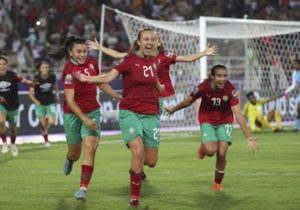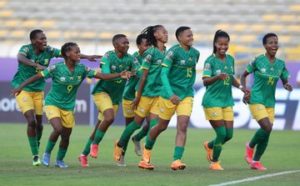WAFCON 2022: final preview

Over 45,000 fans will be packed into the Prince Moulay Abdellah Stadium to watch hosts Morocco in their first ever Women’s Africa Cup of Nations final take on South Africa. The home side go into the match as narrow favourites in what will be a game won on the tightest of margins.
Morocco on the verge of miracle title
Just two years ago, the Atlas Lionesses had not been in a major international tournament for 20 years, and had not even made it past the first round of qualifiers in 18 years.
Fast forward to the present, they are on a 17 match unbeaten run against African teams, qualified for a first World Cup, have defeated the back-to-back-to-back champions and are favourites to win the title.

Years of heavy investment into the women’s game capped off with the arrival of Reynald Pedros as head coach has transformed the fortunes of the North Africans. Pedros came into the tournament with a pedigree that no African national side has ever had, having arrived off the back of winning two consecutive UEFA Champions Leagues with Lyon.
His mark on the team is obvious. The team is well structured, concedes few goals, and carry a huge threat from set pieces. Add to that, the largest and most intense crowd that Africa has ever seen, and the team looks nearly unbeatable.
Banyana looking to right past wrongs
Standing in Morocco’s way is a South African side who are the eternal bridesmaid looking to have their own wedding. This will be Banyana Banyana’s fifth final, a number only bettered by Nigeria. But the South Africans are yet to taste victory.

Their first appearance came in 2000, where they were captained by a certain Desiree Ellis. That captain has since become Africa’s greatest coach in the women’s game, recently winning a record third CAF coach of the year award.
Ellis tasted the bitterest defeat in 2018 when they lost in the final again to Nigeria on penalties, but they have an equally difficult task ahead of them. At times South Africa have played the best football witnessed at this tournament, but with star Thembi Kgatlana ruled out with injury, the side lacks the cutting edge to kill games off. Only Linda Motlhalo and Jermaine Seoposenwe have scored two goals, and the team were lucky to beat Zambia in the semi-finals.
Finishing will be the difference
As expected with two so well coached sides, Morocco and South Africa have created more chances than any other team at the tournament, but they are also the two most wasteful sides at the tournament.
South Africa’s over reliance on Thembi Kgatlana has left them vulnerable without the Racing Louisville forward. But Morocco have similar issues in front of goal. Against Nigeria, the Atlas Lionesses scored their first goal of the tournament from open play, and even that came from an error from the Nigerian keeper Chiamaka Nnadozie.
Both Rosella Ayane and Jermaine Seoposenwe have shown their quality in moments for their nations, but neither has quite found their shooting boots. Ayane, for all her excellent movement and chance creation, has only scored from the penalty spot. Meanwhile Seoposenwe has scored twice but missed a penalty and has similarly struggled to put chances away.
It may come down to one of the forwards to show the class that has been missing to make the difference.
Banyana need to ride the storm and rely on depth
One feature of both semi-finals that was very informative about the two sides was the way the coaches used their substitutes.
Despite playing against nine women for 50 minutes, Morocco could not score the winner against Nigeria. Despite their lack of cutting edge, Pedros only made one substitute during the 120 minutes. Morocco have only ever made one change in their starting 11 between matches. Pedros has a very strong 11, but he clearly does not trust his bench to make the difference.
https://twitter.com/CAF_Online/status/1550273462568091648
On the other side, South Africa played probably their worst half of football at the tournament in the first 45 against Zambia. Desiree Ellis had clearly got her selection wrong, but she bravely changed things up. At half time she brought on Hildah Magaia and Nomvula Kgoale who transformed the game.
If South Africa can ride out the first half in the final where Morocco and their tempestuous support will throw everything at them, the pendulum will shift in South Africa’s favour. Ellis clearly trusts her substitutes to make the difference, and while they don’t have the same depth as Nigeria, they do have players like teenage sensation Nthabiseng Majiya who can come off the bench to change the game.
The tactical match on the side of the pitch will be as fascinating as that of the footballing battle on the pitch, but as is so common in finals, the result is often out of the coaches’ hands and instead settled by a moment of either brilliance or madness.
What they said
Morocco head coach Reynald Pedros:
“We have been working on this for more than a year. We arrive with some certainties and now we have to express it on the pitch. The enthusiasm of the public ensures we have to perform in every match with heart and desire.
“People can see that this team is ready to give everything for its country and its supporters. People have been coming to the stadium in huge numbers. If there was a stadium that seats 70 000 people, it would have been full.
“These are due to the efforts of the Moroccan Federation and the players, and now we must continue and not stop there. We’ll see what happens tomorrow, but it’s already a successful WAFCON.”
South Africa head coach Desiree Ellis:
“Everything we do is geared towards tomorrow, we know it’s going to be a difficult match – no matches in the knockout stages are easy, especially the final but we’re ready for every eventuality.
“I said from the beginning we selected a squad that’s versatile, that’s ready for the eventuality, we’ve had some challenges leading up to some of our games and the team was ready. So we thank coach Pitso and everyone else for the support they’ve given us.
“He’s been here, he’s done it all, he’s someone that we follow because he has led the way, he’s someone that we look up to and we chat often, so we appreciate that and we’ll do our level best tomorrow.”